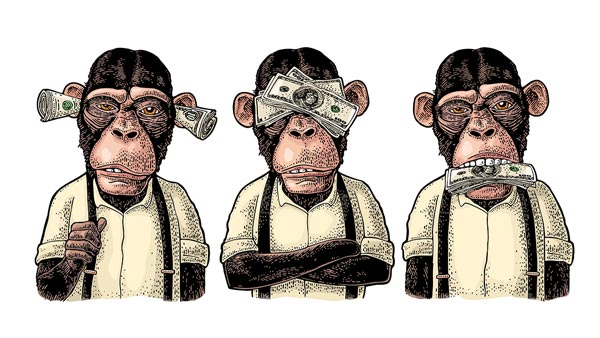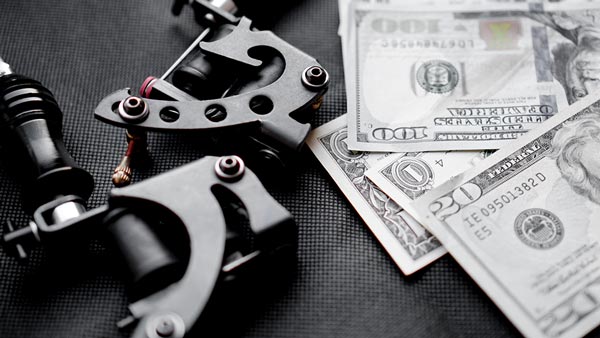Tipping your tattoo artist shouldn’t be overlooked. If you’re wondering why that’s the case and wondering how much to tip tattoo artists, you’re in luck. We’re about to cover that topic thoroughly.
While tattooing has existed in many different forms for a very long time, its western U.S. incarnation has only been around for about since the mid-1800s. Since that time, it’s gone through many incarnations from fast flash tattoos to living masterpieces. These days, it’s a mix of everything about 20% of the adult population claiming to sport some kind of ink.
Tattooing is a legitimate and growing art form and, as such, the people who apply them are, in fact, artists. While a select few have been catapulted into a sort of celebrity, most tattoo artists are small business owners or independent operators using their talents to make a living. They’re creative professionals like chefs, writers, and graphic designers.
Why You Should Tip
First and foremost, it’s important to see tattooing for what it is — a highly personalized service. When you enlist the services of a tattoo artist, you’re engaging their creative vision and asking them to apply that indelibly to your body. You’re going to be looking at their work for a very long time. So, not only should you pay them for that service, tipping is understood to be standard.
Thinking of your tattoo artist as a solo artist or small business owner may help you understand the financial pressures they face on a daily basis. Running a tattoo shop is expensive. Materials, services, supplies, scheduling software, rent, utilities, marketing — your tattoo has to pay for all of these things in one way or another. And none of that even begins to compensate the tattoo artist for their time, talent, and services.
Once you knock off 40-60% for overhead, tattoo artists aren’t pocketing as much as you think.
Taxes are another thing to take into account. If your tattoo artist is an independent contractor that also means they have to settle up with the IRS on their own instead of having taxes withheld automatically from their checks. This often leads to owing the government quite a lot of money come tax season, and your tips can help soften that blow.
In addition to saying thank you, leaving online reviews, and recommending your tattoo artist to friends and family, giving a tip is a concrete way to show your appreciation of their creativity, artistry, and personal service. Chances are, if you want one tattoo, you’re probably going to want two. Developing a good relationship with a great tattoo artist will benefit you, too.

How Much to Tip Tattoo Artists
Unfortunately, there’s no hard and fast rule governing how much to tip tattoo artists.
As with tipping waitstaff, 20-25% percent is a good standard. An easy way to include tipping in your budget is to add it in when getting the estimated costs for having your work done. So, if your tattoo is expected to cost $200, with a 20-percent tip, that’s $240. That said, you can tip more or less, depending on several factors.
For one thing, your willingness to tip will depend on how pleased you are with their work. If you don’t like the work, it makes sense that you would want to tip less. That’s up to you. But keep in mind that a tattoo is a piece of art you wear on your body for personal expression.
The tattoo artist makes your vision a reality on your skin. Choosing the right tattoo artist is as important as choosing the right tattoo. Do your research, first.
Don’t be afraid to ask people with great ink where they got it done. Chances are they’d love to tell you about their tattoo artist and the experiences they had with them.
Another reason you might tip less or choose not to tip at all is because of a bad experience. But, like any service-based industry, it’s not just the artist’s attitude that’s a big deal. You want to be treated with dignity and respect, but so does your tattoo artist. Tipping is a part of that, but so is showing up on time and being ready for your appointment.
In most instances, tipping is appropriate and encouraged. While you can tip less than 15%, try to avoid it. Good work should be recognized, and being broke is no excuse not to tip. If you don’t have the money to tip your artist, rethink getting tattooed until you can.
Or, ask your artist if they’d be interested in being tipped in goods or services if you run your own business and can float a sweet freebie their way in lieu of cash.
Tipping in cash is fine. That way your tattoo artist gets the entirety of the tip and avoids any service fees or taxes. If adding your tip to a credit or debit transaction, add a bit more to cover those fees.

The best time to tip is after your appointment when you’re paying for your services. If your tattoo artist isn’t the person checking you out, just hit them up afterward with a thank you and, “This is for you.” They’ll appreciate it.
Remember, you’re tipping them based on their professionalism and the quality of their work, so there’s nothing wrong with waiting to make sure you’re pleased with the experience before you tip.
You also don’t need to let your tattooer know you’re tipping, but it’s not a bad idea. That way they know you didn’t accidentally overpay them or think they owe you change. In some rare instances, a tattooer might not accept tips if they’re the owner of the shop, but that’s very unlikely to be the case.
There’s no reason to ask your artist about tipping if you plan on tipping them with cash. And, most credit card interfaces offer prompts for adding tips as part of the check-out process, making it even easier. Gratuities are part of the tattoo experience so don’t feel awkward or uncomfortable about them. Just celebrate your new tattoo and throw a little cash around.

Don’t Skip the Tip
Now that you know how much to tip tattoo artists, you’ve got no excuse to not do it. Tattooers work hard to make your vision a reality, and they put permanent art right on your skin. Surely, that deserves a little extra consideration.
Of course, if you’re a tattoo artist yourself, you already know all this. Maybe managing your finances and schedule is the time consuming task you need more help with. A great way to take some of that off your plate is adding credit card processing to your tattoo software. Integrated credit card processing even prompts clients for tips at checkout.



